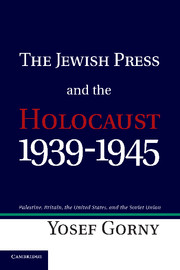 The Jewish Press and the Holocaust, 1939–1945
The Jewish Press and the Holocaust, 1939–1945 1 - The Hebrew-Language Press in Palestine
from Part I - From Concern to Outcry – 1939–1942
Published online by Cambridge University Press: 05 November 2011
Summary
Introduction
The first three years of World War II, between September 1939 and November 1942 – the “in-between” period in our typology – were significant in two respects. The first is general: how the war was being waged on the various fronts. The second is national: the condition of the Jews in the occupied countries.
In the general war arena, the outcome of the global struggle was by no means clear until late 1942, when the British victory at El Alamein and the Soviet triumph at Stalingrad tipped the scales. This was so even though the United States’ entry into the war against Japan and Germany in late 1941 filled the sails of the anti-Fascist camp with hopes of victory.
The uncertainty about how the war would end was paralleled by uncertainty about the fate of the Jews. This period of time through the lens of the Jewish press – as one may judge by the information that it published and the awareness generated as a result – may be divided into three subperiods.
Subperiod 1 – from the beginning of the war to the eve of the Nazi invasion of the USSR in June 1941. During this time, the gravity of the Jews’ predicament and the realization that it was unparalleled in Jewish history were dominant, but the realization that an irreparable national catastrophe was under way had not yet matured.
Subperiod 2 – from Operation Barbarossa (the German invasion of the USSR) to June–July 1942. During this time, first rumors about massacres of Jews in Ukraine and Belarus, as well as reports about mass murder of hundreds of thousands of Jews in these areas, began to arrive. Even so, the press was still dominated by a cautious approach toward the reliability of the information, undoubtedly influenced by vestiges of cautious optimism among the newspapers’ editors.
- Type
- Chapter
- Information
- The Jewish Press and the Holocaust, 1939–1945Palestine, Britain, the United States, and the Soviet Union, pp. 23 - 79Publisher: Cambridge University PressPrint publication year: 2011


